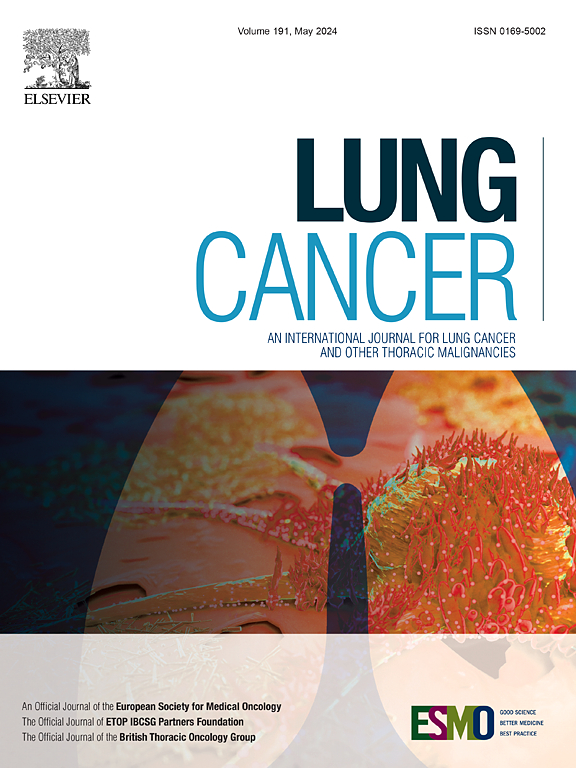Real-world survival outcomes of immune checkpoint inhibitor therapy after standard treatment failure in EGFR-mutated NSCLC: A nationwide cohort study
IF 4.4
2区 医学
Q1 ONCOLOGY
引用次数: 0
Abstract
Background
Immune checkpoint inhibitors (ICIs) have shown limited efficacy in EGFR-mutated NSCLC, and their role in later-line settings remains unclear. This study aimed to evaluate the real-world effectiveness of ICI monotherapy compared to chemotherapy in patients with EGFR-mutated NSCLC who had limited remaining treatment options.
Methods
We conducted a target trial emulation using data from the Cancer Public Library Database under the K-CURE project, which integrates national cancer registry, mortality, medical check-up and health insurance claims data in Korea. Eligible patients were aged ≥ 18 years, had EGFR-mutated NSCLC with progression after both EGFR-TKI and platinum-based chemotherapy, and initiated ICI monotherapy or chemotherapy between August 2017 and December 2020. Propensity score matching was used to balance treatment groups. Overall survival was analyzed using time-dependent statistical methods to account for non-proportional hazards.
Results
Of 1,914 eligible patients, 663 matched pairs were analyzed. While standard Cox analysis showed no significant OS difference (HR 0.91, 95 % CI 0.80–1.03), time-dependent analyses revealed a late survival benefit for ICI beyond 6.8 months (HR 0.72, 95 % CI 0.59–0.88). Subgroup analyses revealed heterogeneous treatment effects, with greater long-term benefits in patients of older age, those with concurrent malignancies, and those without prior osimertinib exposure. Sensitivity analyses suggested a potential role for high PD-L1 expression as a biomarker of ICI response in this setting.
Conclusion
ICI monotherapy may offer time-dependent survival benefits over chemotherapy in selected patients with EGFR-mutated NSCLC after standard treatment failure, supporting its consideration in later-line clinical decision-making.
egfr突变的非小细胞肺癌标准治疗失败后免疫检查点抑制剂治疗的真实生存结果:一项全国队列研究
免疫检查点抑制剂(ICIs)在egfr突变的NSCLC中显示出有限的疗效,其在后期环境中的作用尚不清楚。本研究旨在评估在剩余治疗选择有限的egfr突变的非小细胞肺癌患者中,ICI单药治疗与化疗相比的实际疗效。方法利用K-CURE项目下癌症公共图书馆数据库的数据进行目标试验模拟,该数据库整合了韩国国家癌症登记、死亡率、医疗检查和健康保险索赔数据。符合条件的患者年龄≥18岁,在EGFR-TKI和铂基化疗后发生进展的egfr突变NSCLC,并在2017年8月至2020年12月期间开始ICI单药治疗或化疗。倾向评分匹配用于平衡治疗组。使用时间相关的统计方法分析总生存率,以考虑非比例风险。结果在1914例符合条件的患者中,分析了663对配对。虽然标准Cox分析显示无显著的OS差异(HR 0.91, 95% CI 0.80-1.03),但时间依赖性分析显示ICI超过6.8个月的晚期生存获益(HR 0.72, 95% CI 0.59-0.88)。亚组分析显示了不同的治疗效果,在老年患者、并发恶性肿瘤患者和之前没有接触过奥西替尼的患者中有更大的长期获益。敏感性分析表明,在这种情况下,高PD-L1表达可能作为ICI反应的生物标志物。结论:在标准治疗失败的egfr突变的非小细胞肺癌患者中,ici单药治疗可能比化疗具有时间依赖性的生存优势,支持其在后期临床决策中的考虑。
本文章由计算机程序翻译,如有差异,请以英文原文为准。
求助全文
约1分钟内获得全文
求助全文
来源期刊

Lung Cancer
医学-呼吸系统
CiteScore
9.40
自引率
3.80%
发文量
407
审稿时长
25 days
期刊介绍:
Lung Cancer is an international publication covering the clinical, translational and basic science of malignancies of the lung and chest region.Original research articles, early reports, review articles, editorials and correspondence covering the prevention, epidemiology and etiology, basic biology, pathology, clinical assessment, surgery, chemotherapy, radiotherapy, combined treatment modalities, other treatment modalities and outcomes of lung cancer are welcome.
 求助内容:
求助内容: 应助结果提醒方式:
应助结果提醒方式:


